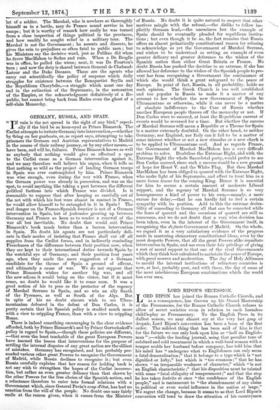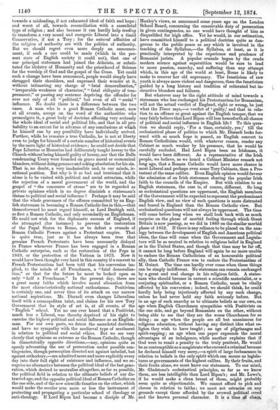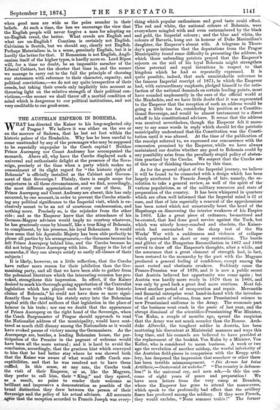LORD RIPON'S SECESSION.
LORD RIPON has joined the Roman Catholic Church, and as a consequence, has thrown up his Grand 'Mastership of the Freemasons, for the Roman Catholic Church refuses to allow of secret societies even in relation to such harmless child's-play as Freemasonry. To the English Press in its dullest season, we may almost say at the very last gasp of despair, Lord Ripon's conversion has been a boon of the first order. The mildest thing that has been said of him is that for the future we can only look upon him as "half an English- man ";—while the leading journal, using that peculiar tone of subdued and cold resentment in which a well-bred woman with a temper scolds her husband before company, has told him that his mind has "undergone what to Englishmen can only seem a fatal demoralisation;" that it belongs to a type which is "not dignified or lofty," but which is "too common;" that he has shown "an irreparable weakness of character," which "is not an English characteristic ;" that his disposition must be tainted with some "fatal obliquity of temperament;" and that the step he has taken forfeits at once "the confidence of the English people," and is tantamount to "the abandonment of any claim to political or even social influence in the nation at large." We regret the change, because it seems to us that Lord Ripon's conversion will tend to draw the attention of his countrymen towards a misleading, if not exhausted ideal of faith and hope ; and worst of all, towards reconciliation with a sacenlotal type of religion ; and also because it can hardly help tending to transform a very sound and energetic Liberal into a timid Conservative, if not a Tory ; for the natural affinities of the religion of authority are with the politics of authority. But we should regret even more deeply an announce- ment, if such a one could be made (which in the pre- sent state of English society it could not), that one of our principal statesmen had joined the Atheists, or substi- tuted the idolatry of Humanity and the priesthood of Science for the worship of God and the gospel of the Cross. Yet could such a change have been announced, people would simply have shrugged their shoulders, and expressed their wonder at it, without intimating any charge of "fatal demoralisation," "irreparable weakness of character," "fatal obliquity of tem- perament," or passing any sentence depriving the offender for ever not only of all "political," but even of all " social " influence. No doubt there is a difference between the two cases. A man who is a good Roman Catholic must, now at all events, accept on the word of the authorities who promulgate it, a great body of doctrine affecting very seriously the whole ideal of social and political life, and that in all pro- bability to an extent far in advance of any conclusions at which he himself can by any possibility have individually arrived. Further, while he remains a true Catholic, he is not at liberty even to judge for himself of a certain number of historical events by the mere light of historical evidence; he could not decide that Pope Liberius or Honoring had deliberately taught heresy to the Church without being himself guilty of heresy, nor that the Bulls condemning Usury were founded on grave moral or economical blunders, without doing penance and asking absolution for his sin. That is, no doubt, a very inadmissible and, to our minds, ir- rational position. But why is it so bad and irrational that it alone is to be visited with political and social ostracism, while the rejection of a moral government of the world, and the gospel of "the concourse of atoms" are to be regarded as private opinions which in no degree diminish a statesman's
claims to political and social influence Perhaps it may be said that the Whole gravamen of the offence committed by an Eng- lish statesman in becoming a Roman Catholic lies in this,—that thenceforward he must regard himself, as Lord Denbigh said, as first a Roman Catholic, and only secondarily an Englishman. He could not wish for the diplomatic success of England, if she attempted (for instance) to prevent the restoration of the Papal States to Rome, or to defeat a crusade of Roman Catholic Powers against a Protestant empire. That is quite true, just as it has always been true that genuine French Protestants have been necessarily disloyal • to France whenever France has been engaged in a Roman Catholic enterprise, such as the restoration of the Pope in 1849, or the protection of the Vatican in 1873. Now it would have been thought very hard in this country if a convert to French Protestantism had been told that his conversion im- plied, to the minds of all Frenchmen, a "fatal demoralisa- tion," or that for the future he must be looked upon as only "half a Frenchman." In the present day, there are a great many faiths which involve moral alienation from the most characteristically national enthusiasms. Positivism is certainly one, and never tires of its attack on our narrow national aspirations. Mr. Disraeli even charges Liberalism itself with a cosmopolitan taint, and claims for his new Tory Government that its style of art is, at all events, of the " English " school. Yet no one ever heard that a Positivist, much less a Liberal, was thereby deprived of his right to exercise the highest political and social influence as an English- man. For our own parts, we detest the sacerdotal doctrine, and have no sympathy with the medieval type of sentiment in relation to political and social ethics. But we see very clearly that opinions as extreme as the Roman Catholic, though in diametrically opposite directions,—nay, opinions quite as openly advocating the use of persecution under possible con- tingencies, though persecution directed not against unbelief, but against orthodoxy,—are admitted more and more explicitly every day into their full right of existence and influence, and we re- cognise no alternative between the political ideal of the last gene- ration, which desired to neutralise altogether, as far as possible, the political field in relation to the ultimate beliefs of our dis- tracted age, and the opposite political ideal of Roman Catholics on the one side, and of the new scientific fanatics on the other, which would make the secular arm more or less the instrument of protecting and propagating a particular school of theology or anti-theology. If Lord Ripon had become a disciple of Mr. Huxley's views, as announced some years ago on the London School Board, concerning the conceivable duty of persecution in given contingencies, no one would have thought of him as disqualified for high office. Yet he would, in our estimation, have committed himself to a political doctrine quite as dan- gerous to the public peace as any which is involved in the teaching of the Syllabus,—the Syllabus, at least, as it is practically interpreted by the experience and prudence of Romanist jurists. A popular crusade began by the crude modern science against superstition would be sure to lead to more passion, anarchy, and suffering than any attempt which, in this age of the world at least, Rome is likely to make to recover her old supremacy. The fanaticism of raw youth is always more violent and dangerous, than the fanaticism guided by a long history and tradition of reiterated but in- structive blunders and failures.
But whatever may be the right attitude of mind towards a statesman who has exchanged his Protestantism for Romanism, will not the actual verdict of England, right or wrong, be just what the Times says,—a verdict of 'guilty,' and that in rela- tion to an offence so great against the English temper, that we may fairly believe that Lord Ripon will lose henceforth all chance of political and social influence in English life ? To this ques- tion we should reply, 'For a time, certainly, yes ;' till the ecclesiastical phase of politics to which Mr. Disraeli looks for- ward with so much hope is passed, an English convert to Roman Catholicism would, with whatever reason, render any Cabinet so much weaker by his presence, that he would be carefully excluded. Had Lord Ripon been an Irishman, it would have been different. As a representative of the Irish people, we believe, as we heard a Cabinet Minister remark not long ago, that a Roman Catholic would have more chance in most Liberal and perhaps even some Tory Cabinets, than a Pro- testant of the same calibre. Even English opinion would favour the admission of an Irish statesman sharing the popular Irish faith to the councils of the Empire. But with relation to an English statesman, the case is, of course, different. So long as ecclesiastical questions are uppermost, the English members of the Government will be expected to represent the predominant English view, and no view of such questions is more distrusted and feared in England than the Roman Catholic view. But ecclesiastical questions will not always be uppermost. The time will come before long when we shall look back with as much surprise on the phase of morbid feeling through which Great Britain is now passing, as we did in 1860 on the similar morbid phase of 1852. If there is any reliance to be placed on the ana- logy between the development of English and American political ideas, the time will come when the Government and Legisla- ture will be as neutral in relation to religious belief in England. as in the United States, and though that time may be far off, it cannot be long before England will again be no more unable to endure the Roman Catholicism of an honourable political ally, than Catholic France was to endure the Protestantism of Guizot. The time can hardly ever come when these things can be simply indifferent. No statesman can remain unchanged by a great and real change in his religious faith. A states- man who should become in earnest a scientific materialist, or a conjuring spiritualist, or a Roman Catholic, must be vitally affected by his conversion ; indeed, we should think, he could hardly help being injuriously affected by any such change, unless he had never held any faith seriously before. But in an age of such anarchy as to ultimate beliefs as our own, an age when English Churchmen sympathise with Positivists on the one side, and go beyond Romanists on the other, without being able to see that they are the worse Churchmen for so doing ; an age when the people are all but unanimous for religious education, without having any distinct idea what re- ligion they wish to have taught ; an age of pilgrimages and spirit-rapping; an age when one paper expounds the moral advantages of an indulgence, while another explains that if God were to remit a penalty to the truly penitent, He would be as contemptible as a magistrate who excused a criminal because he declared himself very sorry,—a spirit of large forbearance in relation to beliefs is the only spirit which can secure us legisla tures or governments of the highest calibre. By their fruits, and their fruits alone, we must know our statesmen. To our mind, Mr. Gladstone's ecclesiastical principles, so far as we know them, are less intelligible than Lord Ripon's; and Mr. Lowe's, if he would make a clean breast of them, might probably seem quite as objectionable. We cannot afford to pick and choose in relation to faiths ; we must not ostracise on any grounds except those afforded by the avowed political creed and the known personal character. It is a time of chaos,
when good men are wide as the poles asunder in their beliefs. At such a time, the less we encourage the view that the English people will never forgive a man for adopting an un-English creed, the better. What creeds are English and what are un-English ? Comtism is certainly not English. Calvinism is Scotch, but we should say, clearly not English. Perhaps Materialism is, in a sense, genuinely English, but it is hardly the better for that. If Romanisan is not English, Angli- canism itself of the higher types, is hardly more so. Lord Ripon will, for a time no doubt, be an impossible member of the Liberal Cabinet, but the shorter that time is, and the sooner we manage to carry out to the full the principle of choosing our statesmen with reference to their character, capacity, and political convictions,—we do not say quite irrespective of their creeds, but taking their creeds only implicitly into account as throwing light on the relative strength of their political con- victions,—the sooner we shall throw off a morbid condition of mind which is dangerous to our political institutions, and not very creditable to our good-sense.
































 Previous page
Previous page